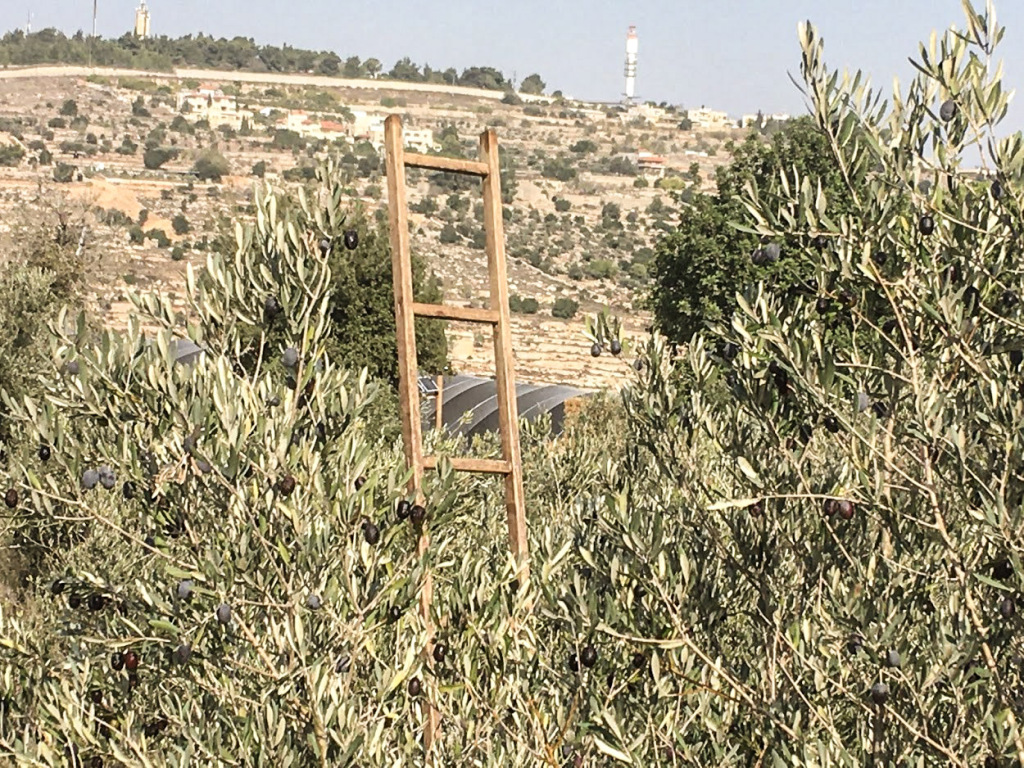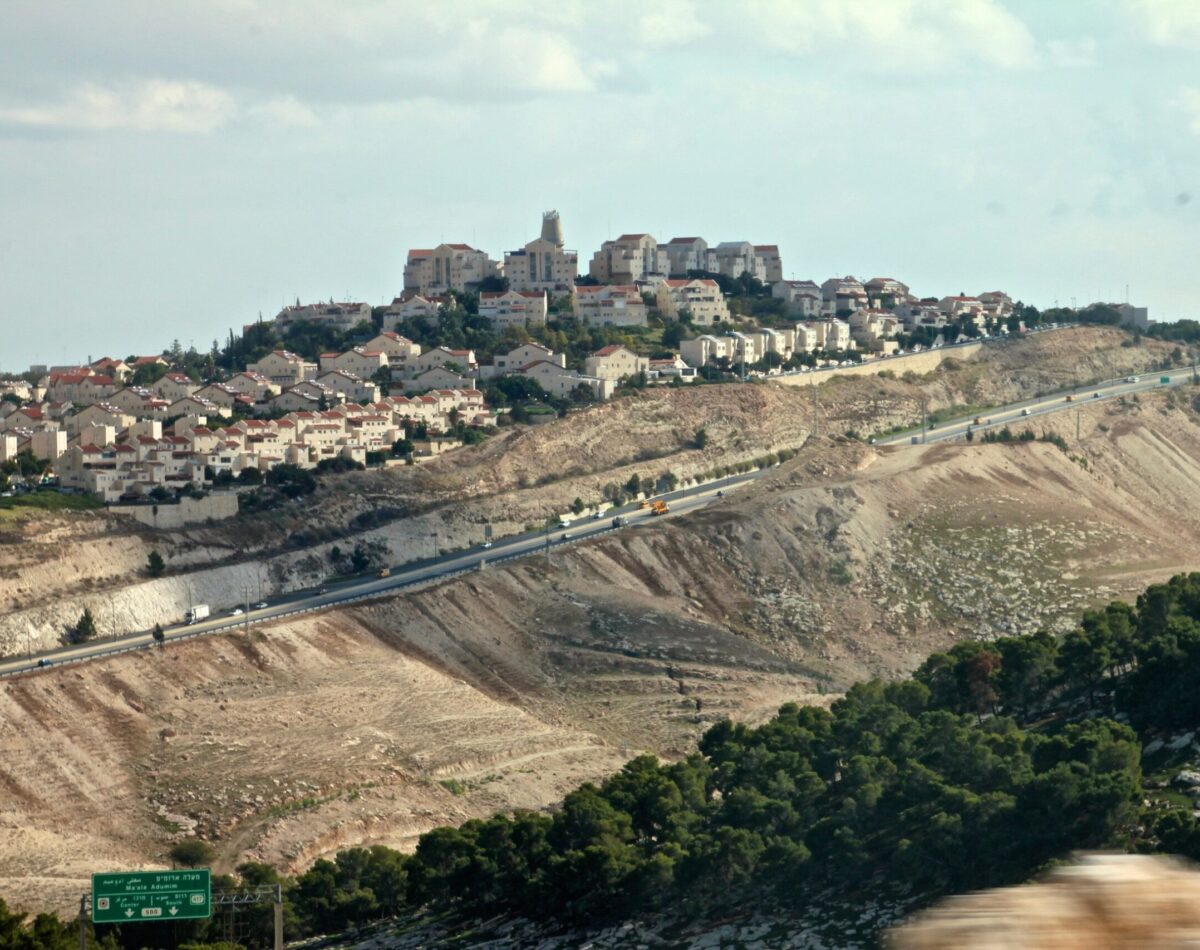‘The oldest olive tree in the world is in a nearby valley and at 4,000 years old still provides olives which will be turned into, what locals tell us, is some of the finest olive oil produced in Palestine. The trees are an integral part of Palestinian culture, growing and thriving despite stony and arid conditions.’
EA Lesley
The Al Makhrour valley is a popular Palestinian hiking area a few kilometres outside of Bethlehem which connects the UNESCO World Heritage site at Battir to the town of Beit Jala. A friend in Bethlehem told us to visit in the late afternoon, just before sunset when the cool breezes and stunning natural scenery would take our breath away. Today when we visit there is no breeze, the midday sun is high in the sky and the air is filled with birdsong and the distant rumble of traffic on Route 60, the main north-south road.
Bilal* takes a break from harvesting his olives. His brother Omar* is pouring coffee from a small metal teapot blackened by the soot of the campfire. The brothers have five acres of olive orchards, the size of two football pitches. The crop this year is good, the trees are heavy with fruit. Three generations of the family have gathered to pick the olives here today. The children play while the trees are harvested, their branches pruned and fruit picked and cleaned ready for processing into oil.
Bilal and Omar’s land is in a renowned beauty spot, known as the ‘breadbasket of Bethlehem’ where the ancient valley terraces are planted with grape vines and olive trees. The Palestinian owners of these plots of land tend them with pride as earlier generations did before them. The oldest olive tree in the world is in a nearby valley and at 4,000 years old still provides olives which will be turned into, what locals tell us, is some of the finest olive oil produced in Palestine. The trees are an integral part of Palestinian culture, growing and thriving despite stony and arid conditions.
When they bear fruit they are described as ‘hamil’ which means pregnant. It can take up to 20 years for a tree to produce olives during which time they are tended and nurtured. The five acres here are well managed with good biodiversity as the olives are interplanted with carob, fig and plums. The grapevines in a neighbour’s plot are golden in the warm mid-morning sun. It feels as if time has stood still. Olives are an important crop. In occupied Palestine olives account for a quarter of gross agricultural income and support the livelihood of 100,000 Palestinian families (UNOCHA, 2018).
As we sip our strong black coffee our eyes are drawn to the edge of Bilal’s field where there is a level area under shady trees with a dining table and chairs to sit on. There is a barbeque and a solar panel hangs from a tree to provide power for lights when dusk falls. Someone has worked hard to create this space to entertain friends and family, but it is not Bilal.
The boundary fence has been taken down and a part of the field has been taken from him to make this scenic place overlooking the valley below. This is the work of his new Israeli neighbours who took over a plot of land next-door two months ago. We are told that they dug a rough driveway on to the land, quickly put up the frame of an agricultural tunnel house and covered it in heavy duty opaque black plastic to form a dwelling. Next came a fence, a padlocked gate and guard dog.
These new neighbours are settlers – Israeli citizens who live in communities built on land in the Israeli occupied West Bank. According to Israeli NGO, B’Tselem, there are 131 settlements which are recognised by the Israeli Ministry of the Interior. Some settlements are agricultural and rural in character while the four largest settlements, Ariel, Ma’ale Adumim, Modi’in Illit and Beitar Ilit have achieved city status.
There are more than 100 additional settlements known as ‘illegal outposts’ built by Israeli citizens without official authorisation or recognition from even the Israeli government. An outpost has no building permit and the first sign of its existence is usually the siting of a temporary structure such as a caravan or tent, which slowly expands and develops.
Outposts are usually built on private Palestinian land and are often followed by a long legal battle in the Israeli courts, where Palestinians disputing the outpost are required to produce land registration documents to prove the land is theirs. Israeli NGO, Yesh Din report that in this asymmetrical legal system, the courts infrequently side with the Palestinians, regardless of the strength of evidence provided. Outposts are increasingly given official legal status and before long, expand further.
Israeli NGO Peace Now reports that the Palestinian owners of the land where the outpost is sited intend to file a police complaint demanding the eviction of the settlers. Unfortunately another recent land dispute between Himanuta settlement and a local Palestinian land owner was decided by an Israeli Court in Himanuta’s favour, disregarding land registration documents.
Now it is the November olive harvest and Bilal and Omar’s families are working close to the broken fence and the outpost buildings. Today there are workmen busily installing solar panels onto the roof of a new barn. There is beginning to be an appearance of permanency in the compound.
‘They came from the outpost and approached me to ask if I needed any help with the olive harvest this year,’ Bilal says. ‘I said no, because once they are invited onto my land…..’ He shrugs. He and his family know that this is likely to be the beginning of difficult times ahead because where one group of settlers set up an outpost, others almost always follow. Once the settlers start coming onto his land it is likely they will not leave.
It becomes clear that the settlers are frequently walking onto Bilal’s land without an invitation. As we pick olives two men from the outpost walk through the gap in the broken fence to ask what we are all doing in the olive groves. Why do we pick by hand? Why don’t we use machines? Soon a third man appears and when he is asked by Bilal’s neighbour about dismantling the barbeque area he says that he will have it removed and repair the fence in two days’ time. There is a palpable tension in the air which intensifies when later the men stand and watch from the outpost as two soldiers come to ask the reason we are here. Bilal tells them that this is his land and he is harvesting olives, just as he has done for many years and as his father and grandfather have done before him. The soldiers leave, for now.
One week later the olive harvest is over and EAs visit to see if the barbeque area is gone and the fence repaired. It is still there. On the barn the installation of the solar panels is completed. Driving away we notice that the rough driveway into the outpost has been resurfaced with concrete. There is a growing sense that the new neighbours are here to stay.
*Not their real names



